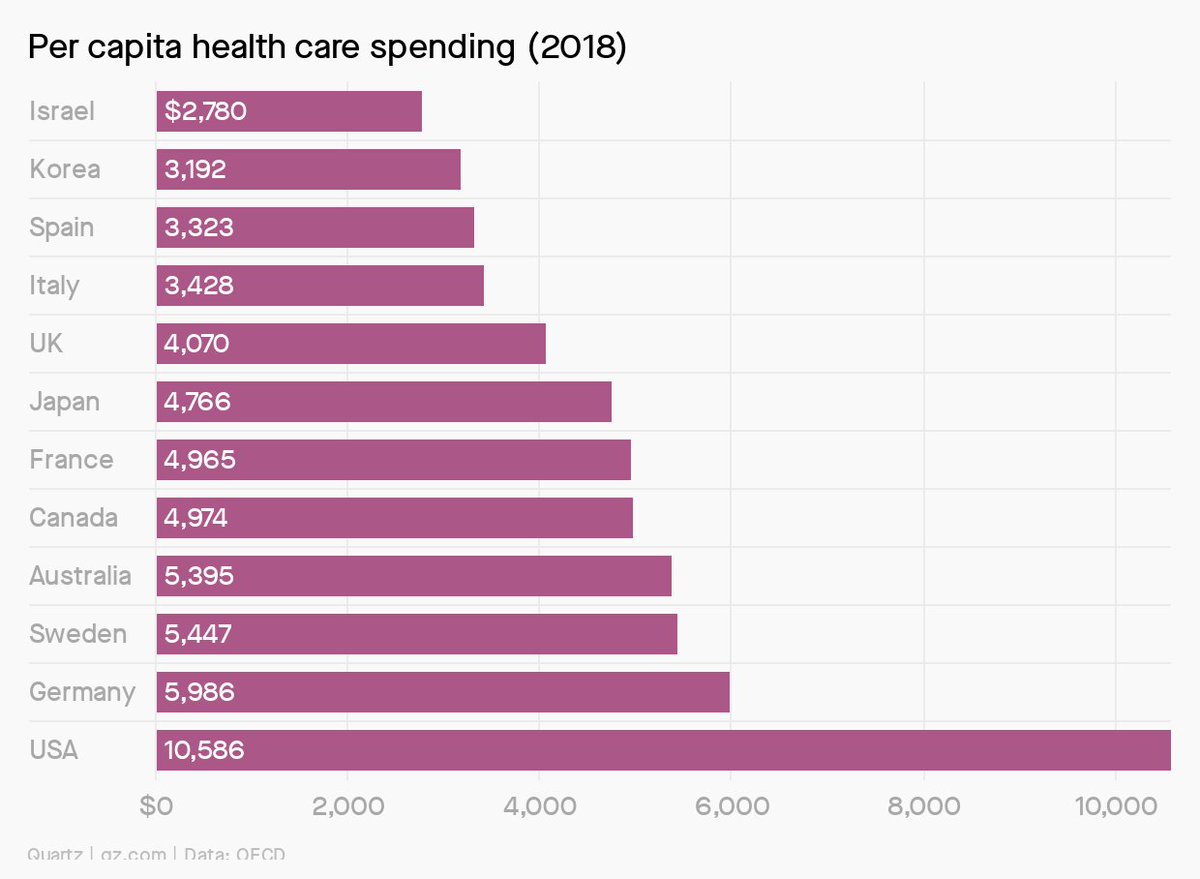Thread
For the past couple of weeks, as the world dealt with the coronavirus, I dove deep into one way people, especially in the US, have mobilized to face it, and other health crises: Medical crowdfunding. I looked at who resorts to it, and why, and who benefits from it. 1/some
For the past couple of weeks, as the world dealt with the coronavirus, I dove deep into one way people, especially in the US, have mobilized to face it, and other health crises: Medical crowdfunding. I looked at who resorts to it, and why, and who benefits from it. 1/some
Medical crowdfunding is a global phenomenon, but nowhere else it& #39;s as ubiquitous as it is in the US. The reason, you may have guessed it, is this chart: 2/
In the US, medical crowdfunding basically sits at the intersection of a broken health system, social media, and startup culture, and tries to be a third way to face medical costs: Not public, not entirely on the individual (medical debt leads personal bankruptcy causes). 3/
But because it is generated as part of an unequal system, not only does it not provide a solution, but it ends up exacerbating the inequality that caused the problem in the first place. Research by @NJKenworthy, @jeremycsnyder, @ArthurCaplan, @awsamuel & others shows how. 4/
This is because when we donate we do so based on our biases, rewarding perceived worthiness over need. Minorities, people with chronic diseases, and older people are less likely to get funding. And if you are better off to begin with, your network is more likely to have money 5/
You can read more about it here in @qz& #39;s field guide on medical crowdfunding: #4">https://qz.com/1836183/how-online-crowdfunding-is-transforming-global-healthcare/ #4">https://qz.com/1836183/h...
6/there& #39;s more
6/there& #39;s more
Of course, the US isn& #39;t the only place to have medical crowdfunding. Campaigns exist in other countries, too, even rich ones with government-funded health care. There is a key difference, however: It& #39;s largely not medical expenses that get funded, but related costs 7/
Or, money is raised to support existing institutions—as is the case of one of the most successful campaigns ever launched, in Italy. @ChiaraFerragni & @Fedez were able to raise nearly €4.5 million for @SanRaffaeleMI against the coronavirus emergency through @gofundme. 8/
Their money funded two additional ICU units for the hospital at mindblowing speed: it seems unlikely traditional funding could have done the same. This impressive campaign as a case study on the successes and pitfalls of medical crowdfunding: https://qz.com/1836221/record-breaking-gofundme-campaigns-are-helping-italy-fight-covid-19/">https://qz.com/1836221/r... 9/counting
From India, @manavikapur also looked at the correlation between poor health care coverage and rise of crowdfunding. She also reports on the personal side of having to ask your network for financial help: https://qz.com/india/1835705/why-medical-crowdfunding-is-so-prominent-in-india/">https://qz.com/india/183... 10/
All this thinking about giving made me think of a Victor Hugo fable I had read as a teenager, in which a saint refuses to help a devil because it would make him vain to do a good action, and he needs to stay humble. (My mom looked for the book in my room for me https://abs.twimg.com/emoji/v2/... draggable="false" alt="❤️" title="Red heart" aria-label="Emoji: Red heart">) 11/
https://abs.twimg.com/emoji/v2/... draggable="false" alt="❤️" title="Red heart" aria-label="Emoji: Red heart">) 11/
So I spoke with a few professors of philanthropy and behavioral science researchers to understand why we give, what& #39;s in it for us, and what kind of giving is more ethical: https://qz.com/1836274/is-it-helpful-to-donate-to-medical-gofundme-campaigns/">https://qz.com/1836274/i... 12/ almost there
But medical crowdfunding is not the game, it& #39;s the player. Until there are better ways to cover health care expenses, people have a right to resort to it, of course. So I tried to look at what works, and what doesn& #39;t when building a campaign. It boils down to storytelling 13/
Thanks to @DarylHatton of @FundRazr and @RoyMorejon of @ep_innovation & @ArtKickstart, I broke down what works, and what doesn& #39;t when asking for financial help to pay for medical expenses:
https://qz.com/1836238/how-to-raise-money-for-a-medical-emergency/">https://qz.com/1836238/h... 14/
https://qz.com/1836238/how-to-raise-money-for-a-medical-emergency/">https://qz.com/1836238/h... 14/
The financial costs of coronavirus on Americans, particularly for those who have lost jobs, will add yet another dimension of tragedy to this horror. As @TheOnion joked: "Health experts worry coronavirus will overwhelm America’s GoFundMe system." It& #39;s funny because true. 15/
One of the downsides of the success of crowdfunding is that it& #39;s distracting people in the US from looking at the big problem, which is that it shouldn& #39;t be on people to put their illness on display to get money to treat it. Will coronavirus remind people they deserve better? 16/
This was fascinating to report. Big shout out to @petergelling who edited, @JaxBischof & @wfrick for shepherding this through despite the extenuating circumstances of, you know, the apocalypse, @serrilha for the good looks, and @JamesMDaw for illustrating 17/ just one more!
Being a @qz member is awesome and you want to be one. Join us here: https://qz.com/members/ ">https://qz.com/members/&... 18/basta

 Read on Twitter
Read on Twitter


